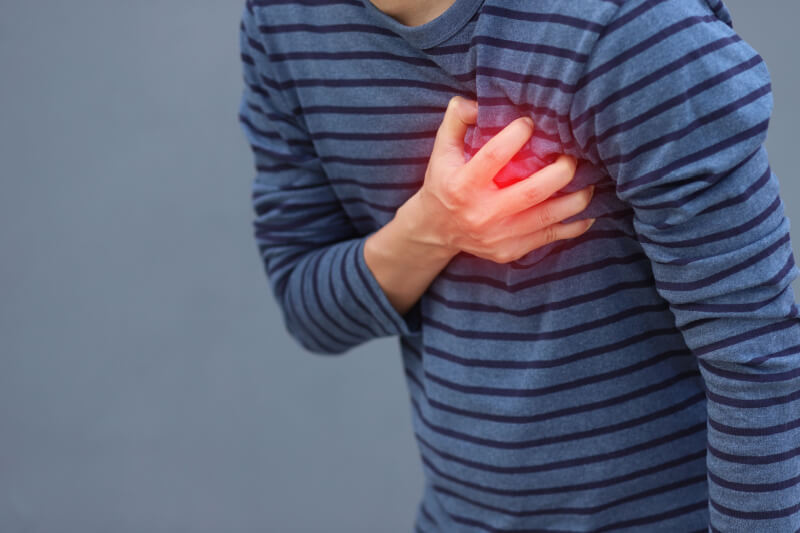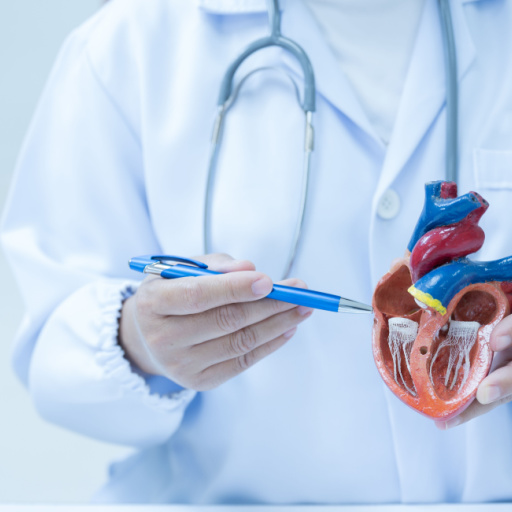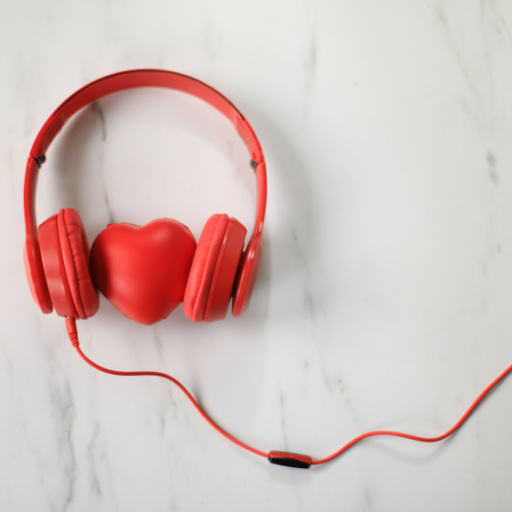Heart block, or arrhythmia (irregular heartbeat), is a health condition characterized by inefficient electrical conduction in your heart. It causes interference in the signals traveling from different heart chambers and regions, resulting in irregular blood pumping.
इनके बारे में जानें:
- What is heart blockage?
- Common symptoms of heart blockage
- Causes of heart blockage
- How to detect heart blockage?
- Treatment options for heart blockage
- Preventing heart blockage: Lifestyle changes
What is heart blockage?
Every time your heart beats, an electrical signal travels from the upper chambers (atria) to the lower chambers (ventricles). The signal, in turn, directs your heart to pump blood and contract. When this signal gets slowed or disrupted, it leads to heart blockage, changing the heartbeat’s rhythmic pattern and speed.
Electrical signals and their role in a healthy heartbeat
Your body utilizes electric impulses to control several muscle movements, including your heart. It works with your autonomic nervous system, which is responsible for all involuntary body functions involving heartbeat, breathing, digestion, etc. The timing of your heart muscle’s action is also essential. Your brain relies on your heart’s electric signals to make the heart chambers squeeze a certain way, resulting in a heartbeat. Usually, your heart beats 50 to 100 times per minute when you are inactive or resting.
How blockage disrupts the heart’s electrical system?
Blockage in the coronary arteries, also known as coronary artery disease (CAD), disrupts your heart’s electrical system by limiting the blood flow necessary for the heart to function effectively. The heart requires a consistent blood flow to provide oxygen and nutrients to its cells and regulate your heartbeat.
Plaque buildup in your coronary arteries can restrict blood flow to the heart muscle, disturbing the electrical impulses that manage your heartbeat. These disturbances may lead to arrhythmias or heart attacks if the blockage causes oxygen deprivation in a part of the heart muscle, leading to tissue death.
Common symptoms of heart blockage

Heart blockage symptoms depend on what type of heart blockage you are experiencing. Here are the signs for the three types:
First-degree symptoms
First-degree heart block is the mildest type of heart blockage. While there are no explicit symptoms of this type, in some cases, individuals may experience an abnormal हृदय गति and rhythm detected in an ECG (electrocardiogram).
Second-degree symptoms
Here are some of the most common second-degree heart blockage symptoms:
- सीने में दर्द
- जी मिचलाने की समस्या
- Shallow or fast breathing
- Heart palpitations
- Lightheadedness
- थकान
Third-degree symptoms
Symptoms of this type of heart blockage are often severe, and they require immediate medical attention:
- चक्कर आना
- Fainting
- सांस फूलना
- Decreased pulse rate
- Severe chest pain
Causes of heart blockage
Heart block is a medical condition that develops in the later stage of your life. However, some people are born with congenital heart block (a defect in the heart’s structure). Here are some of the factors that may cause heart blockage:
- Individuals with a history of heart attack
- Recent open heart surgery
- Rheumatic fever
- High potassium intake
- लिम्फोमा
- Cardiac tumors
- हाइपरथाइरोइडइज़म
- हाई ब्लड प्रेशर लेवल
- High blood sugar लेवल
How do you detect heart blockage?

You can opt for specific tests to check your हृदय का स्वास्थ्य. Your cardiologist may ask you to undergo these tests:
ECG
Electrocardiograms record your heart’s activity, rate, rhythm and timing of the electrical signals as they go through your heart. In this process, a portable ambulatory monitor is placed on your chest for 48 hours to collect information about your heart’s electrical activities.
Electrophysiology
This test involves inserting a long tube through a blood vessel and guiding it to your heart to measure and record accurate electrical activity from inside your heart.
Angiogram
It is a diagnostic procedure using X-ray imaging to view how blood flows through the heart’s blood vessels. This process can help medical professionals detect blood vessel abnormalities, clots, or plaque build-up.
Treatment options for heart blockage
You often don’t need medical attention if you are going through a first-degree heart blockage. Still, you should check the underlying cause and incorporate lifestyle changes like swimming or brisk jogging to stay active. Consuming heart-healthy whole grain foods, fruits and vegetables, omega-3 rich nuts, fish, and vegetable oils are some dietary changes you can include. Steer clear from excess oily, fried, salty, or sugary foods, which are common causes of high cholesterol and plaque build-up in the arteries.
However, if you have second or third-degree heart blockage, you will need a pacemaker (a battery-powered device) that sends electrical signals to your heart.
Preventing heart blockage: Lifestyle changes
Here are some lifestyle changes you can incorporate to reduce the risk of heart blockages:
- Incorporate a heart-healthy diet, like the Mediterranean diet, including lots of green vegetables and whole grains.
- Exercise daily and aim for at least 150 minutes of physical activity every week.
- Get 7 to 9 hours of sleep every night.
- धूम्रपान छोड़ें.
- Practise yoga and सचेतनपूर्ण मेडिटेशन and channel your negative thoughts into positive habits to manage stress.
Heart blockage is a serious condition requiring immediate attention, as it can lead to heart attacks and strokes. Most people suffering from heart blockage can lead normal lives. A medical expert can help you get the right treatment and management plan for a healthy heart.
Stay tuned to the Activ Living Community. Keep up to date with the latest health tips and trends through expert videos, podcasts, articles, and much more on पोषण, फिटनेस, सचेतन, और लाइफस्टाइल से जुड़ी बीमारियां like Asthma, Blood Pressure, Cholesterol, and Diabetes. Activ Living ke saath sahi sehat ki shuruaat ABHIkaro.
You may also be interested in the following blogs:
- Surviving A Heart Attack: Things To Do When You Are Back On Your Feet
- Top 4 Benefits Of Beta-Blockers For Heart Health
Popular Searches
How to lower blood pressure | Fruits good for liver | Unhealthy foods | रागी के लाभ | बेसल मेटाबोलिक रेट | हाई ब्लड प्रेशर के लिए एक्यूप्रेशर पॉइंट्स | Ayurvedic medicine for blood pressure | How to control cholesterol at home | Homeopathy for Asthma | Biological Age | Home remedies for TB | Natural beta blockers | Negative effects of internet | Types of walking | ब्लड प्रेशर कैलकुलेटर | ब्लड शुगर कैलकुलेटर | BMI कैलकुलेटर





 1800-270-7000
1800-270-7000









